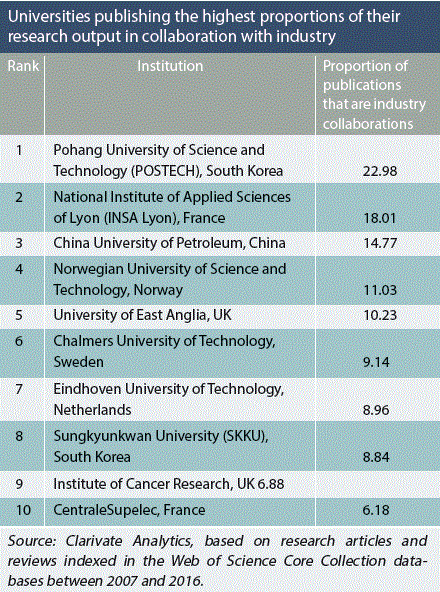South Korean universities are among world leaders when it comes to publishing research with industry, according to new data.
The Pohang University of Science and Technology, founded by Korean steel company POSCO in 1986, tops a table of universities publishing the highest proportions of their research output in collaboration with industry produced by Clarivate Analytics for Times Higher Education, with 23 percent of its publications coming via such links. In eighth place is South Korean institution Sungkyunkwan University, which has an alliance with Samsung so far-reaching that some describe the Korean conglomerate as having “acquired” the university. The UK’s University of East Anglia and Institute for Cancer Research also figure in the Top 10, in fifth and ninth places respectively.
Scandinavia also features prominently, with the Norwegian University of Science and Technology’s tie-up with its industrial research offshoot SINTEF — which focuses on solar, wind and hydro power — putting it in fourth place. Sweden’s Chalmers University of Technology, which links closely with Volvo companies on research projects including electric and autonomous vehicles, is ranked sixth.
 The fact that South Korea was a poor, agriculture-based economy until the early 1960s and has since undergone an industrial miracle may be one of the explanations for its strength in university-industry collaboration. “Korea has one of the highest R&D intensities in the world and a focus on high-tech industries,” says Martin Hemmert, professor of international business at Korea University Business School. “However, coming from a catch-up position, many companies did not have strong competencies in basic research, hence they try to strengthen and augment them via research collaborations with universities.”
The fact that South Korea was a poor, agriculture-based economy until the early 1960s and has since undergone an industrial miracle may be one of the explanations for its strength in university-industry collaboration. “Korea has one of the highest R&D intensities in the world and a focus on high-tech industries,” says Martin Hemmert, professor of international business at Korea University Business School. “However, coming from a catch-up position, many companies did not have strong competencies in basic research, hence they try to strengthen and augment them via research collaborations with universities.”
However, with Samsung embroiled in a major corruption scandal in Korea that has led to the impeachment of the nation’s president — and now the firm’s acting head has been indicted on charges including bribery and embezzlement — this development might be interpreted by some as a cautionary tale about the dangers of universities becoming too close to a single company.
(Excerpted and adapted from The Economist and Times Higher Education)